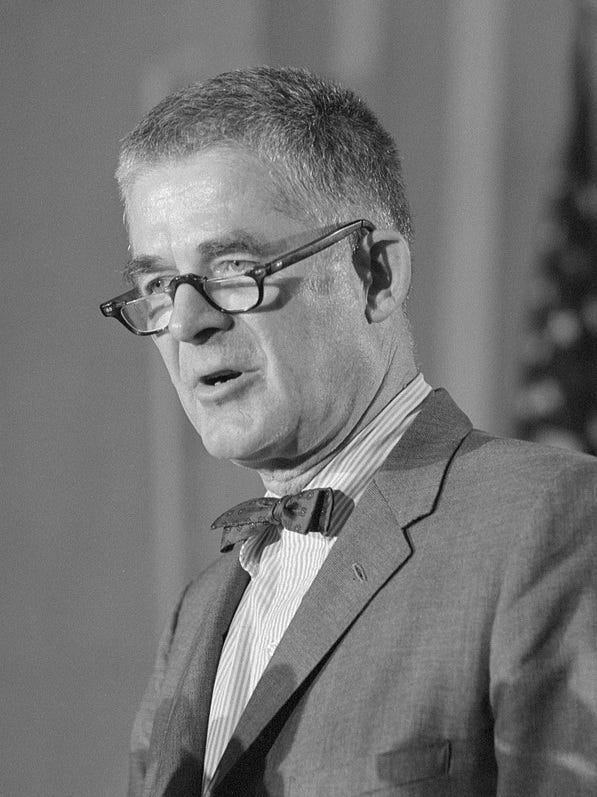Archibald Cox, Watergate and the Saturday Night Massacre
The US Department of Justice has been under attack before. This speech by Watergate special prosecutor Archibald Cox from 20 October 1973 is a classic, and probably hastened the Nixon resignation.
As President Trump sets about decimating the public sector, taking a razor to government more in the fashion of a vengeful and demented vandal than an old-fashioned cost cutting conservative, I’ve felt sadness and panic for American readers. The Department of Justice was always going to be in his gun sight, especially those who worked for Special Prosecutor Jack Smith. This summary of the carnage by Harry Litman of the Talking Feds Substack is as excellent as it is depressing.
Litman mentions this as the third occasion the DOJ has faced attack from within.
The first episode was the famed Saturday Night Massacre of 1974 during the Watergate investigation, when President Richard Nixon ordered Attorney General Elliot Richardson to fire Special Prosecutor Archibald Cox. Both Richardson and his deputy, William Ruckelshaus, refused the president’s order and resigned. (It was Robert Bork, the then Solicitor General, who ultimately carried out the order, with the acquiescence of the other two.) The refusals led more or less directly to Nixon’s resignation. It was a defining moment for the Department, still invoked today as one of its finest hours.
The second episode occurred in 2021, at the end of Donald Trump’s first administration. Trump sought to strongarm the Department into writing a false letter to Georgia election officials to further the plot to steal the election. In a dramatic Oval Office showdown, the entire Department leadership, led by acting Attorney General Jeff Rosen, told Trump that they would all resign if he installed Jeff Clark as a puppet AG and went ahead with his plans. Trump relented, and again the Department reaffirmed its institutional strength.
Both of those crises were events of high drama when the continued institutional integrity of the Department of Justice was on the line.
The current crisis has not yet reached a white-hot moment of showdown, and that may never happen. That is because, stung by his failed shakedown the last time around, Trump already has stacked the deck by installing lackeys to issue the orders. For that reason and others, including the servile see-no-evil Republicans in Congress, the institutional attack he has initiated is considerably more menacing, and the outcome considerably more in doubt.
Litman recalls the Saturday Night Massacre as one of the crisis days for the DOJ, albeit a disaster thwarted. As a speeches newsletter, I thought we might feature Archibald Cox’x brilliantly worded press conference that changed the trajectory of public opinion.
Cox was the special prosecutor investigating the Watergate break-and subsequent cover up. He obtained a court order for the Nixon White House tapes, which Nixon was not keen on following, because of the small problem of the tapes proving his guilt. Instead, Nixon offered the 'Stennis Compromise', a summary of the tapes made by an independent (and apparently hard of hearing!) Senator Stennis. The Saturday Night Massacre followed. Nixon ordered the firing of Cox, and the Attorney General and Deputy AG refused to follow through. The third in line AG did fire Cox, but the damage had been done to Nixon’s case, and a federal judge would rule that Cox’s firing was illegal.
As Litman notes, the USA is facing a graver institutional crisis than Watergate. Nixon was a professional politician who was willing to break rules but still be generally bound by a constitutional democratic system. Trump is an autocrat who wants to dismantle the rules, and the Constitution, and the institutions of government.
Best wishes to all Americans in a terrible news week,
Tony Wilson
Archibald Cox: 'I'm certainly not out to get the President of the United States', Press conference, Pre Saturday Night Massacre - 1973
20 October 1973, Washington DC, USA
I'm not looking for a confrontation. I've worried a good deal through my life about problems of imposing too much strain upon our constitutional institutions, and I'm certainly not out to get the President of the United States.
As you all know, there has been and is evidence—not proof, perhaps, in some instances, but clearly prima facie evidence—of serious wrongdoing on the part of high Government officials, wrongdoing involving an effort to cover up other wrongdoing.
It appeared that the papers, documents and recordings of conversations in the White House, including the tapes, would be relevant to getting the truth about these incidents.
I'm referring not only to the Watergate incident itself, but to other things involving electronic surveillance, break-ins at a doctor's office and the like.
Last night we were told that the court order would not be obeyed, that the papers, memoranda and documents of that kind would not be provided at all. And that, instead of the tapes, a summary of what they showed would be provided.
I think it is my duty as the special prosecutor, as an officer of the court and as the representative of the grand jury, to bring to the court's attention what seems to me to be noncompliance with the court's order.
You will say, “Well, so far as the tapes are concerned, forget legalisms. Isn't this a pretty good practical arrangement?” I find four, to my way of thinking, insuperable difficulties with it.





